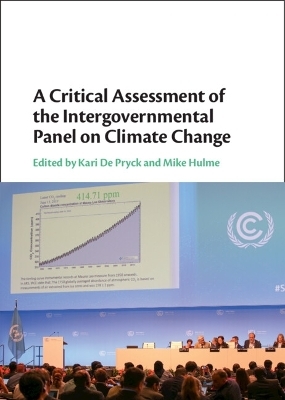
A Critical Assessment of the Intergovernmental Panel on Climate Change
Cambridge University Press (Verlag)
978-1-316-51427-6 (ISBN)
The Intergovernmental Panel on Climate Change (IPCC) has become a hugely influential institution. It is the authoritative voice on the science on climate change, and an exemplar of an intergovernmental science-policy interface. This book introduces the IPCC as an institution, covering its origins, history, processes, participants, products, and influence. Discussing its internal workings and operating principles, it shows how IPCC assessments are produced and how consensus is reached between scientific and policy experts from different institutions, countries, and social groups. A variety of practices and discourses – epistemic, diplomatic, procedural, communicative – that make the institution function are critically assessed, allowing the reader to learn from its successes and failures. This volume is the go-to reference for researchers studying or active within the IPCC, as well as invaluable for students concerned with global environmental problems and climate governance. This title is also available as Open Access via Cambridge Core.
Kari De Pryck is a Fellow from the Swiss National Science Foundation (SNSF) in the Laboratoire PACTE at the Université Grenoble Alpes. She is interested in knowledge production on global environmental problems and has been studying the IPCC's internal workings since 2013 using ethnographic methods. She is a member of the first research project that was given official access to the IPCC Working Groups for the IPCC's Sixth Assessment Reports (AR6). Mike Hulme is a Professor of human geography at the University of Cambridge. He has spent his career studying climate change. In 2007 he received a personal certificate from the Nobel Committee marking his 'significant contribution' to the work of the IPCC, which received a joint-award of the Nobel Peace Prize that year. He is the author of Why We Disagree About Climate Change (Cambridge University Press, 2009).
1. Why The Need For This Book? M. Hulme and K. De Pryck; Part I. Governance: 2. Origin And Design T. Skodvin; 3. Procedures O. Leclerc; 4. Venues F. Hartz and K. De Pryck; 5. Reports J. E. Livingston; 6. Learning S. Beck and B. Siebenhüner; Part II. Participation: 7. Participant Diversity A. Standring; 8. Early Career Researchers K. M. Gustafsson; 9. Governments H. Hughes; 10. Observers Y. Yamineva; 11. Peer Review P. N. Edwards; Part III. Knowledges: 12. Disciplines A. C. Petersen; 13. Indigenous Knowledge Systems B. Van Bavel, J. Petrasek MacDonald and D. Sambo Dorough; 14. Climate Models H. Guillemot; 15. Scenarios B. Cointe; 16. Controversies S. Asayama, K. De Pryck and M. Hulme; Part IV. Processes: 17. Uncertainty J. O'Reilly; 18. Integration M. Vardy; 19. Scientific Consensus-Seeking M. Hulme; 20. Governmental Approval K. De Pryck; 21. Policy Relevance And Neutrality M. Mahony; Part V. Influence: 22. Political Context R. Lidskog and G. Sundqvist; 23. Civic Epistemologies J. C. H. Miguel, R. R. Taddei and M. Monteiro; 24. Boundary Objects B. Lahn; 25. Visuals I. Lorenzoni and J. Harold; 26. Communications W. Pearce and A. Lindemer; 27. Re-Imagining The IPCC: A Proposal C. A. Miller; 28. What Has This Book Achieved? K. De Pryck and M. Hulme; References; Index.
| Erscheinungsdatum | 12.12.2022 |
|---|---|
| Zusatzinfo | Worked examples or Exercises |
| Verlagsort | Cambridge |
| Sprache | englisch |
| Maße | 175 x 250 mm |
| Gewicht | 770 g |
| Themenwelt | Naturwissenschaften ► Biologie ► Ökologie / Naturschutz |
| Recht / Steuern ► EU / Internationales Recht | |
| Recht / Steuern ► Öffentliches Recht ► Umweltrecht | |
| Sozialwissenschaften ► Politik / Verwaltung ► Europäische / Internationale Politik | |
| Wirtschaft ► Volkswirtschaftslehre | |
| ISBN-10 | 1-316-51427-7 / 1316514277 |
| ISBN-13 | 978-1-316-51427-6 / 9781316514276 |
| Zustand | Neuware |
| Haben Sie eine Frage zum Produkt? |
aus dem Bereich


